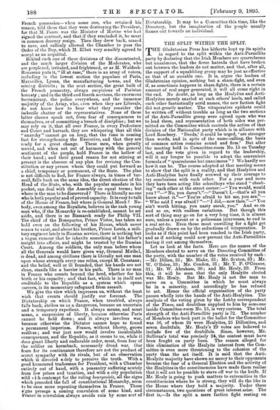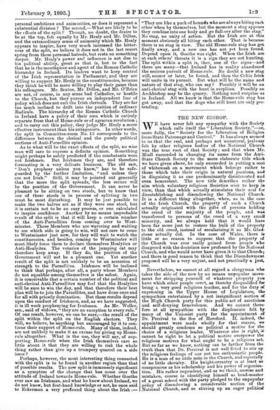THE SPLIT WITHIN THE SPLIT. T HE Gladstonian Press has hitherto
kept up its spirits in regard to the split within the Anti-Parnellite party by declaring that the Irish Members are quarrelsome but unanimous, that the fierce hatreds that have broken out between the leaders do not matter, and that, after all, the support of a squabbling group may be just as effective as that of an amiable one. It is, argue the leaders of Gladstonian opinion, nothing but a sham-fight, and even if, as sometimes happens in sham-fights, there is a certain amount of real anger generated, it will all come right in the end. No doubt, as long as the Healyites and Anti- Healyites merely snarled at each others' heels, and called each other fantastically acrid names, the new faction fight did not greatly matter. The vituperative epithets could be written off without trouble as long as the two sections of the Anti-Parnellite group were agreed upon who was to lead them, and representation of both sides was per- mitted on the Committee which controls the action of that division of the Nationalist party which is in alliance with Lord Rosebery. Deeds,' it could be urged, are stronger than words, and in spite of the name-calling, the basis of common action remains sound and firm.' But after the meeting held in Committee-room No. 15 on Tuesday last, and the vote given in regard to the leadership, will it any longer be possible to adopt the convenient formula of "quarrelsome but unanimous " ? We hardly see how it can be. The course adopted at that meeting seems to show that the split is a reality, and that Healyites and Anti-Healyites have finally screwed up their courage to try conclusions with each other. For a year and more they have been acting like schoolboys who stand " cheek- ing " each other at the street corner:—" You would, would you ? "—" No, you daren't."—"Daren't I,—that's all you know about it."—" You're afraid to hit me, you are."— " Who said I was afraid? "—"I did,—nowthen."—" You ain't worth hitting, you nasty sneak, you." And so on and so on, with endless variations. But though this sort of thing may go on for a very long time, it is almost sure, unless a parent or a policeman intervenes, to end in a real set-to. Even those most unwilling for a fight get gradually drawn on by the seductions of vituperation. It looks as if this point had been reached in the Irish party, and as if nothing could now prevent the .A.nti-Parnellites having it out among themselves. Let us look at the facts. Here are the names of the Members elected to serve on the Directing Committee of the party, with the number of the votes received by each : —Mr. Dillon, 35; Mr. Blake, 35; Mr. Sexton, 33; Mr. W. O'Brien, 33; Mr. Condon, 31; Mr. T. P. O'Connor, 31; Mr. W. Abraham, 30; and Mr. Healy, 29. From this, it will be seen that the only Healyite elected was Mr. Healy. But Mr. Healy is not the man to serve on a Committee in which he must always be in a minority, and accordingly he has refused to act. Hence the official organisation of the party passes wholly into the hands of the Anti-Healyites. The analysis of the voting given by the Lobby correspondent of the Times, and doubtless supplied to him by someone inside Committee-room No. 15, is very curious. The total strength of the Anti-Parnellite party is 72. The number of Members who took part in the ballot for the Committee was 56, of whom 24 were Healyites, 25 Dillonites, and seven doubtfals. Mr. Healy's 29 votes are believed to include five of the doubtfuls. Since, however, Mr. Sullivan's total was precisely 24, the contest must have been fought on party lines. The reason alleged for this elimination of the Healyite interest from the Com- mittee is even more threatening to the cohesion of the party than the act itself. It is said that the Anti- Healyite majority have shown no mercy to their opponents because the fear of a General Election and the activity of the Healyites in the constituencies have made them realise that it will not be possible to stave off war to the knife. If Mr. Healy is going to push matters to extremities in the constituencies where he is strong, they will do the like in the House where they hold a. majority. Under these circumstances, two questions of great interest arise. The first is,—Is the split a, mere faction fight resting on personal ambitions and animosities, or does it represent a substantial division ? The second,—What are likely to be the Effects of the split ? Though, no doubt, the desire to be at the top, felt equally by Mr. Healy and Mr. Dillon, and the extraordinary sense of animosity which Mr. Healy appears to inspire, have very much increased the bitter- ness of the split, we believe it does not in the last resort spring from these personal hatreds, but rests on something i deeper. Mr. Healy's power and influence s not due to his political ability, great as that is, but to the fact that he is the mouthpiece and agent of the Roman Catholic hierarchy in Ireland. Its leaders want to keep control of the Irish representation in Parliament, and they are willing to support Mr. Healy in the constituencies, because they think he will be more willing to play their game than his colleagues. Mr. Sexton, Mr. Dillon, and Mr. O'Brien are not, of course, in any sense bad Catholics, or hostile to the Church, but they pursue an independent line of policy which does not suit the Irish clericals. They are far too much inclined to drift into the position of ordinary Radicals. The hierarchy of the Roman Catholic Church in Ireland have a policy of their own which is entirely separate from that of Home-rule or of agrarian revolution ; and to carry out this policy, they judge Mr. Healy a more effective instrument than his antagonists. In other words, the split in Committee-room No. 15 corresponds to the difference between the clerical and the purely political sections of Anti-Parnellite opinion.
As to what will be the exact effects of the split, no wise man will care to express a definite opinion. Something might perhaps be safely predicted if the combatants were not Irishmen. But Irishmen they are, and therefore forecasting is a very delicate business. The old saw, 'Don't prophesy unless you know," has to be safe- guarded by the further limitation, "and unless they are not Irish." Still, it may be pointed out generally that the more the split spreads, the less secure will be the position of the Government. It can never be pleasant to be sitting on two stools, but to know that one of these stools is in process of splitting in two must be most disturbing. It may be just possible to make the two halves act as if they were one stool, but it is certain not to be an easy process, or one calculated to inspire confidence. Another by no means improbable result of the split is that it will keep a certain number of the Anti-Parnellites from coming over to West- minster. Those Members who are wavering and waiting to see which side is going to win, will not care to come to Westminster just now, for they will wait to watch the constituencies, and besides, coming to Westminster will most likely force them to declare themselves Healyites or Anti-Healyites. The votaries of the jumping cat may therefore keep away. If they do, the position of the Government will not be a pleasant one. Yet another result of the split is not unlikely to be an accession of strength to the Parnellites. Irishmen will be inclined to think that perhaps, after all, a party whose Members do not squabble among themselves is the safest. Again, it is conceivable that a certain number of the political and anti-clerical Anti-Parnellites may feel that the Healyites will be sure to win the day, and that therefore their best plan will be to join the Parnellites, and have done once and for all with priestly domination. But these results depend upon the conduct of Irishmen, and, as we have suggested, it is ill work prophesying for Irishmen. As Mr. Weller, sen., said of widows, "they are an exception to every rule." Of one result, however, we can be sure,—the result of the split within the split on the English electors. They will, we believe, be anything but encouraged by it to con- tinue their support of Home-rule. Many of them, indeed, are not unlikely to make it an excuse for giving up Home- rule altogether. What is the use, they will say, of sup- porting Home-rule when the Irish themselves care so little about it that they are willing to risk the whole thing rather than give up a trumpery quarrel on a side issue ?
.Perhaps, however, the most interesting thing connected with the split is to be found in another region than that of possible results. The new split is immensely significant as a symptom of the change that has come over the attitude of Ireland towards Home-rule. Whether Goethe ever saw an Irishman, and what he knew about Ireland, we do not know, but first-hand knowledge or not, he once said to Eckerman a. very profound thing about the Irish :— "They are like a pack of hounds who are always biting each other when by themselves, but the moment a stag appears they combine into one body and go full-cry after the stag." No stag, no unity of action. But the Irish are at this moment obviously all biting each other. That is because there is no stag in view. The old Home-rule stag has got finally away, and a new one has not yet been found. Depend upon it, Goethe was right. When the Irish are at each others' throats it is a sign they are not hunting. The split within a split is, then, one of the signs—and there are many—that Ireland has in reality abandoned the serious pursuit of Home-rule. No doubt a new stag will, sooner or later, be found, and then the Celtic Irish will unite in its pursuit. But what will be the name and nature of that stag, who can say ? Possibly it will be an anti-clerical stag with the hunt in surplices. Possibly an Archbishop may be the quarry. Nothing need surprise us in Ireland. All we know is that the Home-rule stag has got away, and that the dogs who still hunt are only pre- tending.







































 Previous page
Previous page